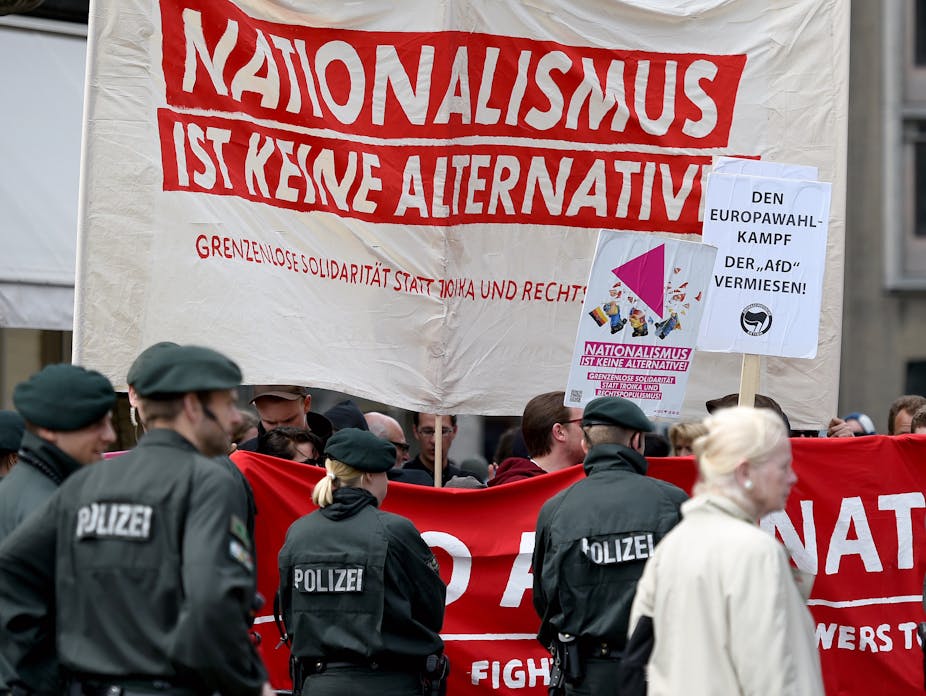No country takes European Parliament elections more seriously than does Germany. Many posters have adorned lampposts around the country since mid-April and discussions in the media centre round the parties and personalities that may (or may not) be gaining representation in Brussels in late-May. In previous campaigns these discussions generally centred round how best to achieve the rather nebulous concept of European unity. While that still resonates, the 2014 campaign undoubtedly has more nuances than normal.
The centre-right Christian Democratic Union (CDU), led at the national level by Angela Merkel, is generally remaining true to the pro-EU messages that it has always espoused: “Vote CDU so that Europe can bring hope for all”, as one of the most ubiquitous of the party’s slogans states. Although Merkel is not playing a particularly prominent role in the campaign, her influence remains clear; safe hands, no surprises.

The CDU’s traditional message is, however, in stark contrast to the message being sent out by its sister party in Bavaria, the Christian Social Union (CSU). The CSU claims to be a firm supporter of European integration, but it also articulates a plethora of criticisms of the way that the EU works. And these criticisms have enjoyed a degree of popular resonance. The institution at the centre of this is the European Commission (the CSU wants, for example, to see its membership halved), but it also fires out broadsides that have a decidedly populist touch. No more countries should be accepted in to the EU, radically fewer rules and regulations should stem from Brussels and, perhaps most controversially, the EU should tighten up immigration rules (particularly for Romanians and Bulgarians).
There are probably two main reasons for this rather more sceptical tone; one of them political and the other institutional. The political one comes in the form of the Alternative for Germany (AfD). The AfD was formed in 2013 with the solitary aim of forcing Germany out of the Euro currency area. The AfD has been careful to claim that it is not anti-European, and comparisons with Britain’s UKIP are misleading.

The institutional reason for the shift towards euro-criticism comes in the fact that the Federal Constitutional Court (BvG) has ruled that for the first time ever in either a nation-wide or EP election, the 5% barrier won’t be in force. The BvG decided that this barrier was an unnecessary hindrance to small parties and a stable democracy like Germany should not be throttling them in this way. For the AfD (and others such as the Free Democrats and the libertarian “Pirates”), this was something of a gift from heaven. The AfD may well have polled 5% anyway, but the threat of just missing out again has now been totally removed. The AfD can breathe easy, as it need only get around 0.9 per cent to ensure parliamentary representation. Germany subsequently will have a party that fits, if still rather uneasily, the Eurosceptic bill in Brussels post-May 2014.
In terms of the CDU/CSU’s main rival, the Social Democrats, the 2014 EP election comes at a strange time. The Grand Coalition that both groupings have only recently signed up to ensures that they are reluctant to really attack each other. And besides, the Social Democrats don’t have a narrative for Europe that is much different to that of the Christian Democrats. That Martin Schulz is the candidate for European Commission President on behalf of the European Party of Socialists (PES) is seen as being all well and good, but it is unlikely to see the SPD bounce back with a vengeance from its 2013 election defeat. The SPD is subsequently adopting a damage-limitation strategy with a view to simply getting through the campaign unscathed and ultimately usurping the CDU/CSU as Germany’s largest political grouping in 2017.
In short, the EP election campaign in Germany is seeing more Euro-critical talk than ever before, and that will ensure that the AfD will indeed be represented in Brussels come the end of May. The large parties are trying to tap in to the pro-European consensus that still underpins German politics, but they are doing so at a time when enthusiasm for the EU project is not as great as it once was. In truth, both the CDU/CSU and the SPD are probably hoping that election day comes and goes quickly, without too much damage being done.

